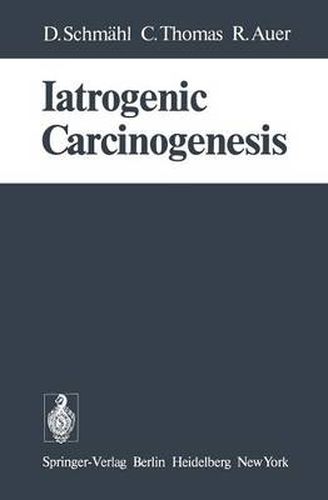Readings Newsletter
Become a Readings Member to make your shopping experience even easier.
Sign in or sign up for free!
You’re not far away from qualifying for FREE standard shipping within Australia
You’ve qualified for FREE standard shipping within Australia
The cart is loading…






This title is printed to order. This book may have been self-published. If so, we cannot guarantee the quality of the content. In the main most books will have gone through the editing process however some may not. We therefore suggest that you be aware of this before ordering this book. If in doubt check either the author or publisher’s details as we are unable to accept any returns unless they are faulty. Please contact us if you have any questions.
The purpose of this book, which is written mainly for pharmacothera pists, is to draw the physician’s attentions, through specific examples, to iatrogenic (i.e., diagnostically or therapeutically induced) carcino genesis. The book is not intended, however, to arouse public concern. It has been known for some time that each therapeutic measure has a risk-benefit ratio, the estimation of which requires an understanding of carcinogenic side-effects. The number of iatrogenic tumors published so far is not large; however, we assume that there are a number of cases that have not been registered. In the past it was not generally recognized that medical treatment might involve carcinogenic risks; moreover, various therapeutic measures are often used simultaneously so that it may be difficult to trace the cause of tumor formation to a specific agent. Animal experiments and clinical observations during the past few years have contributed to our knowledge of the possible hazards of drugs. We have compiled the most important literature on the subject without, however, attempting completion. The present book may help the pharmacotherapist balance the benefit of a drug against its potential risk, and is thus consistent with the medical principle of nil nocere. We thank Mrs. M. Gomille (Institut fur Toxikologie und Chemothera pie, Deutsches Krebsforschungszentrum, Heidelberg) for her help in the preparation of the manuscript.
$9.00 standard shipping within Australia
FREE standard shipping within Australia for orders over $100.00
Express & International shipping calculated at checkout
This title is printed to order. This book may have been self-published. If so, we cannot guarantee the quality of the content. In the main most books will have gone through the editing process however some may not. We therefore suggest that you be aware of this before ordering this book. If in doubt check either the author or publisher’s details as we are unable to accept any returns unless they are faulty. Please contact us if you have any questions.
The purpose of this book, which is written mainly for pharmacothera pists, is to draw the physician’s attentions, through specific examples, to iatrogenic (i.e., diagnostically or therapeutically induced) carcino genesis. The book is not intended, however, to arouse public concern. It has been known for some time that each therapeutic measure has a risk-benefit ratio, the estimation of which requires an understanding of carcinogenic side-effects. The number of iatrogenic tumors published so far is not large; however, we assume that there are a number of cases that have not been registered. In the past it was not generally recognized that medical treatment might involve carcinogenic risks; moreover, various therapeutic measures are often used simultaneously so that it may be difficult to trace the cause of tumor formation to a specific agent. Animal experiments and clinical observations during the past few years have contributed to our knowledge of the possible hazards of drugs. We have compiled the most important literature on the subject without, however, attempting completion. The present book may help the pharmacotherapist balance the benefit of a drug against its potential risk, and is thus consistent with the medical principle of nil nocere. We thank Mrs. M. Gomille (Institut fur Toxikologie und Chemothera pie, Deutsches Krebsforschungszentrum, Heidelberg) for her help in the preparation of the manuscript.